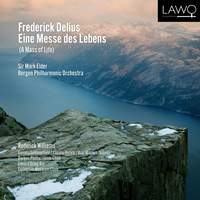Recording of the Week,
Delius's A Mass of Life from Sir Mark Elder and the Bergen Philharmonic
Completed in 1905 and premiered in full by Sir Thomas Beecham four years later, the work remains a relative rarity in concert and isn’t especially well-represented on disc: Beecham’s own recording and Sir Charles Groves’s account from 1971 have long since disappeared from the catalogue, although fine recordings from David Hill and Richard Hickox are both still available on Naxos and Chandos respectively.
Although Delius is a composer close to Elder’s heart, he’d never tackled A Mass of Life until initiating this project with the Bergen Philharmonic: the recording was made following two performances which marked the beginning of his tenure as the orchestra’s Principal Guest Conductor last September, and on the evidence here his connection with both score and orchestra was already firmly bedded in before the red light went on.
Elder’s deep love for this music shines through in every phrase, although he does have one misgiving. ‘The title is the one thing about the piece that’s a disaster!’ he fulminated on a video-call last week, explaining that it sets up false expectations about what is essentially ‘a humanistic work about the life-force’. And that life-force bursts forth with hair-raising impact in the exuberant opening bars, as the Edvard Grieg Kor and Collegium Musicum hit the ground running in the great choral hymn ‘O du mein Wille!’. Delius pushes his singers to near-Wagnerian extremes from the outset, but there’s never so much as a smidgen of strain or flagging energy-levels as the sopranos vault up to the first of many top Cs, and Elder’s control over the balance is such that neither diction nor expressivity are compromised.
The other three soloists are so ideally cast that I found myself wishing that Delius had given them a little more to do: Gemma Summerfield’s radiant soprano glows gently in the postscript to ‘O Mensch, gib acht!’ (Delius’s response to the text here being markedly different from Mahler’s approach a decade earlier), Claudia Huckle’s rich contralto brings real pathos to her wistful admonishment of the faithless Zarathustra, and homegrown tenor Bror Magnus Tødenes shines through quite beautifully in the ensembles.
With its whispers of the Good Friday Music from Parsifal (Delius had visited Bayreuth nine years earlier), the long closing section weaves its own peculiar spell: Williams is here at his most eloquent, and Elder’s pacing of the long diminuendo as the blazing final chorus ebbs away is a marvel. As we signed off our Zoom call, he confided that his guiding hope throughout the sessions was to ‘make new friends for Delius’s magnum opus’. He’s pulled it off with flying colours.
Roderick Williams (baritone - Zarathustra), Gemma Summerfield (soprano), Claudia Huckle (contralto), Bror Magnus Tødenes (tenor)
Bergen Philharmonic Orchestra, Edvard Grieg Kor, Collegium Musicum Choir, Sir Mark Elder
Available Formats: 2 CDs, MP3, FLAC, Hi-Res FLAC, Hi-Res+ FLAC






